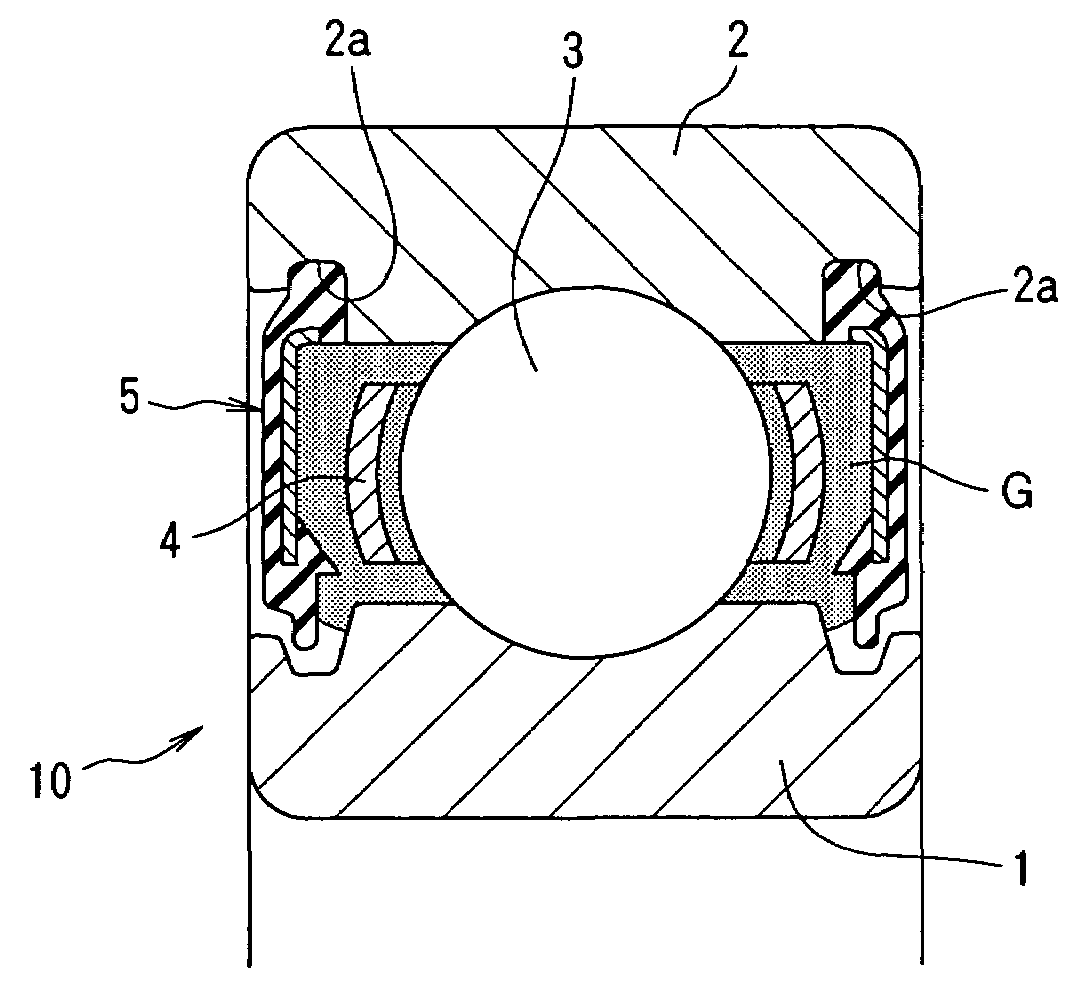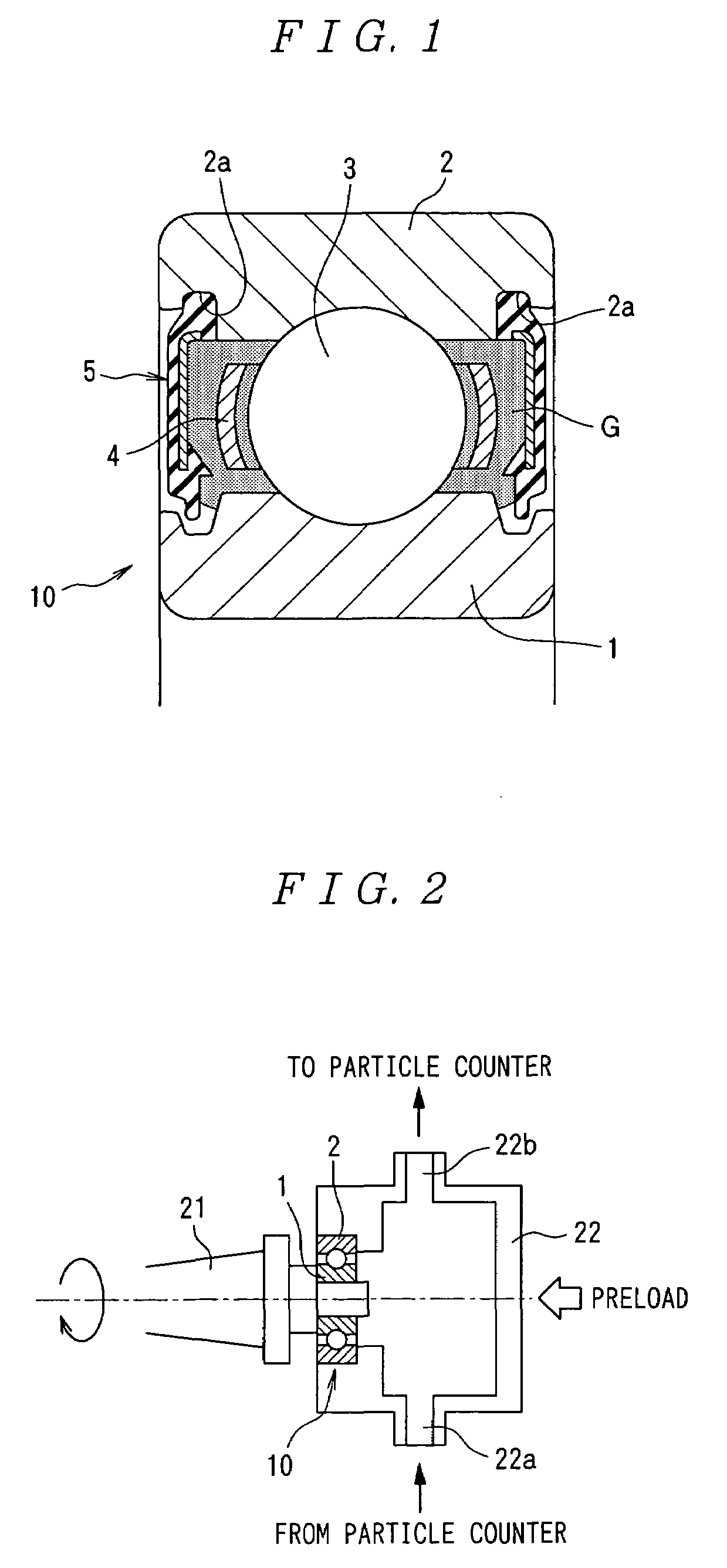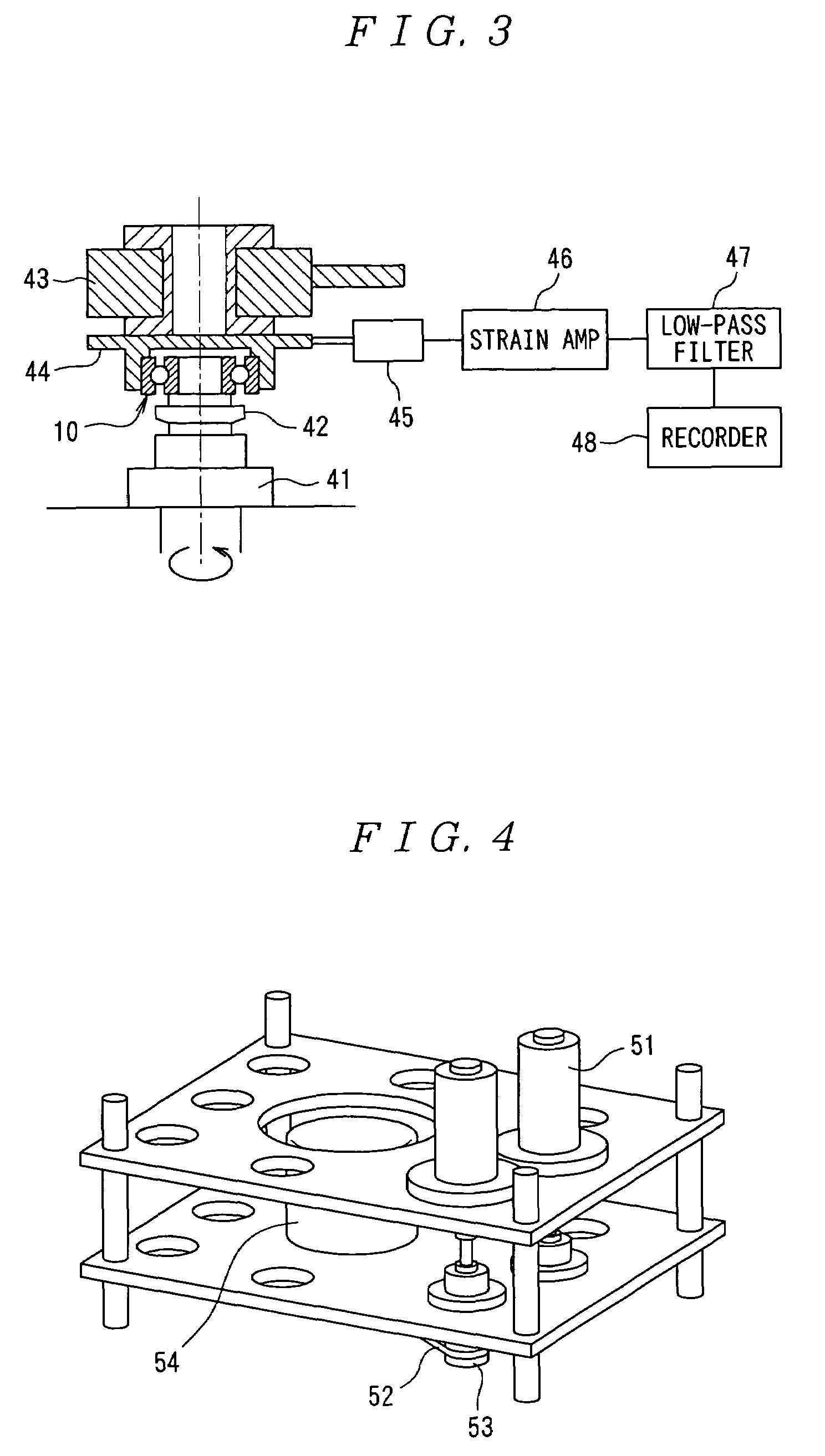Moreover, with the development of high-precision electronic intelligence equipment and semiconductors in recent years, the use conditions (temperature, speed, etc.) of rolling apparatuses, which are used in electronic intelligence equipment and
semiconductor manufacturing machines, have become increasingly strict.
For example, in the case of electronic intelligence equipment such as HDD used under a clean
atmosphere, if a gaseous oil or the fine particles of grease are released from the inside of a bearing when a rolling apparatus rotates, the fine particles pollute a recording medium or the like and cause operation errors.
However, in the above
sodium complex
soap-
mineral oil grease, the dispersibility of the thickener is insufficient and so it hardly becomes homogenous, and thereby problems regarding acoustic and vibration performances occur in the early stage of rotation of the rolling bearing.
In addition, since this grease has strong hygroscopicity and gets hard over time, and thereby the flow property in the rolling bearing decreases, this grease also has a problem of causing insufficient
lubrication and readily generating abnormal sounds from the cage.
Therefore, when excellent performance of low torque and
low noise is required, the above described
lithium soap-ester oil grease has been used at times. However, since this grease easily disperses (causes a large amount of dusts), there is a great risk that the grease might pollute a recording medium or the like when it is used in a rolling bearing for HDD.
Moreover, since the temperature used for the rolling bearing for HDD is more and more increased, the above described
lithium soap-ester oil grease cannot be applied in some cases.
Further, the grease compositions as disclosed above in Japanese Patent Laid-Open Nos. 2000-109874 and 2001-187892 comprise a very expensive
silicone oil or fluoro oil, these grease compositions are expensive when compared with common greases.
(2) Cars (passenger cars) tend to be directed towards downsizing, weight saving and the expansion of the
living space, and therefore cars are forced to reduce their
engine room space.
However, under a high-temperature condition of 160° C. or higher, even this grease generates seizure in an early stage, and so a grease having further higher heat resistance is required.
However, since it is difficult to add additives that can be mixed into common greases into the above described fluoro greases, these greases are likely to have poor lubricating ability,
rust protection and a metallic
corrosion preventing property.
Moreover, the fluoro greases have another
disadvantage in that these greases are more expensive than
synthetic oil type greases by approximately 5 to 20 times.
However, since a
mineral oil or
synthetic oil that is a
base oil of the
urea grease has a poor affinity for a fluoro oil, the above grease composition has a high
oil separation percentage, and therefore this grease composition has a
disadvantage in that the use of the grease composition is inappropriate for a bearing used in components which rotate at a high speed.
For example, the metallic soap grease such as an alminum complex grease has excellent lubricating ability, but it cannot maintain the grease structure for a long time under high-temperature conditions.
The grease comprising
polyurea is likely to cause hardening phenomenon, and the grease comprising a terephthalamic acid
metal salt has large
oil separation.
However, the grease described in the above Patent Publication still has a problem regarding insufficient extreme-pressure property and water resistance.
However, although these greases are excellent in heat resistance, they have a disadvantage in that they have poor lubricating ability, load carring capacity and rust protection.
However, when this
calcium sulfonate complex grease is used under high-temperature conditions over 180° C., it does not have the same level of heat resistance as a fluoro grease.
Moreover, as described in Japanese Patent Laid-Open No. 11-72120, in the rolling bearing used in each of the above components, there are some cases where
hydrogen generates by water present in the bearing, and the generated
hydrogen enters in a bearing steel constituting an inner ring, an outer ring and rolling elements, thereby causing a flaking of formed white structure due to
hydrogen brittleness.
However, since it is difficult to add additives that can be mixed into common greases into the above described fluoro greases, these greases are likely to have poor lubricating ability, rust protection and a metallic
corrosion preventing property.
Moreover, the fluoro greases have another disadvantage in that these greases are more expensive than
synthetic oil type greases by approximately 5 to 20 times.
However, since a
mineral oil or synthetic oil that is a base oil of the
urea grease has a poor affinity for a fluoro oil, the above grease composition has a high
oil separation percentage, and therefore there is a disadvantage that the use of this grease composition is inappropriate for a bearing used in components which rotate at a high speed.
However, as described in the “
Lubrication Control Manual Book” edited by the Japan Lubricating Oil Society and the
Lubrication Control
Diffusion Task Force (the Japanese Lubricating Oil Society, published Mar. 20, 1990) and “A Brief History of Lubricating Greases” written by Arthur T. Polishuk (Llewellyn & McKane, Inc., published 1998), it has previously been thought that, when different types of grease compositions are mixed, the properties of the grease compositions are altered and deteriorated in many cases.
When a significant deterioration occurs in a grease, the grease structure is destroyed, significant
softening of the grease or decrease of the dropping point occurs, and the grease is liquefied at times. Moreover, there are also cases where additives which are added to a grease composition, act on one another and reduce the performance of the grease composition.
However, probably because it has generally been believed that the mixing of grease components comprising different types of thickener is not good, the above method has seldom been used.
 Login to View More
Login to View More 


